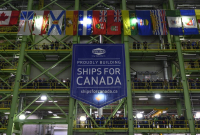Support strong Canadian climate journalism for 2025
Canada's federal procurement minister says she wishes the Irving company and its lawyers hadn't threatened to sue reporters asking questions about the company's federal shipbuilding contracts.
And while Public Procurement Minister Carla Qualtrough stopped short Thursday of saying whether the company's actions were appropriate, she said the government is reviewing its policies on divulging journalists' names and other personal information to companies with government contracts.
"We're working on our policies to make sure we do a better job of protecting your privacy while at the same time making sure we get you the information that you need that's accurate," Qualtrough said on the sidelines of the annual Cansec arms-trade show in Ottawa.
Twice in recent months, federal officials have forwarded media questions, the names of reporters and other information to Irving after being asked about aspects of government contracts that had been awarded to the company.
The Globe and Mail says a lawyer for Irving contacted the newspaper Wednesday after it asked the government whether the company had invested in an Alberta french-fry plant to fulfil its re-investment obligations under a naval shipbuilding contract.
Postmedia reporter David Pugliese says Irving Shipbuilding president Kevin McCoy called him in March after Pugliese contacted the federal government for information about alleged welding problems on one of the ships that Irving is building for the navy.
In both cases, the Globe and Pugliese say their questions and personal information were forwarded to Irving, which warned them it would sue if their stories contained false information about the company or allegations of misconduct.
Irving Shipbuilding spokesman Sean Lewis acknowledged in an emailed statement Thursday that two reporters were recently threatened with legal action, though "only as a last resort."
"We did advise reporters that we would pursue legal action because we knew the reporters had highly inaccurate information that would cause our company, and the reputation of our hardworking employees, considerable reputational damage," Lewis said.
Qualtrough, meanwhile, defended federal officials' approaching the company for information when reporters ask questions as necessary for ensuring accurate and up-to-date answers.
But when asked about the company contacting journalists and threatening lawsuits, Qualtrough said: "Well, I wish they hadn't ... You always have a right to ask those legitimate questions and I prefer not to speculate on the appropriateness.
"It's certainly not a behaviour I would engage in, and I wish there was respect shown to journalists for doing their jobs because these are very complex questions and it's a complex industry. So we need to make sure you get the most information."
The minister sidestepped questions about how the government would address the issue with Irving.
"We don't have a say in necessarily in what our suppliers message," she said. "But our job is to make sure we can always do a better job at respecting your privacy."
Asked for comment on Thursday, the Privacy Commissioner's office confirmed that "we have received a complaint involving (the Department of National Defence) and (Public Services and Procurement Canada) on this matter and that we are looking into it."
Qualtrough also admitted procurement officials have clamped down too hard on companies interested in bidding for defence contracts from speaking to the media about the proposed procurements.
Several companies have privately complained to The Canadian Press in recent months about new rules largely forbidding any discussions with journalists on upcoming projects and competitions, including some involving billions of taxpayer dollars.
"I think we've gone too far on that, to tell you the truth," Qualtrough said. "I actually don't know the origin. I think it was just an incremental, over-time practice that went a little too far and we're going to relax that. And we're looking at doing that. I've directed my department to do that."





Comments
"we would pursue legal action because we knew the reporters had highly inaccurate information"
So why wouldn't Irving provide accurate information to the reporters instead of threatening them in advance?
And how did Irving know that the reporters had inaccurate information?